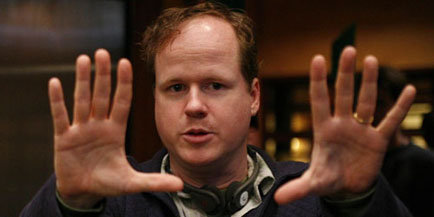Mythology: Joss Whedon
By Martin Felipe
May 1, 2012
With Cabin in the Woods being all the rage among discerning filmgoers and The Avengers about to explode among mainstream filmgoers, I’d like to take a different approach to this Mythology installment. Rather than looking at a particular show, I think I’ll address one of the geniuses of the world of genre storytelling. Joss Whedon, the man behind both of the aforementioned movies, is the master of the modern televised mythology. Yes, he trumps even the likes of a JJ Abrams or a Ronald D Moore, in my estimation.
Not to disparage these other folks. They’re brilliant in their own right, but Whedon stands above them all. He creates worlds that grow and evolve over time. He explores all corners of these universes, often to surprising results. They are thematically rich, yet he presents them with a wink, a sense of humor that deflates any pretension. He populates them with interesting characters that are multifaceted and evolve over time. And he plays for keeps.
When the show Buffy the Vampire Slayer debuted in the late ‘90s, it had to overcome the reputation of the movie, a silly trifle that most folks had forgotten by the time the show came along. The legend is renowned now, but at the time, Whedon had to disavow the film. It didn’t conform to his vision for the character, he claimed. The studio meddled and turned what he envisioned as a feminist commentary on horror conventions into a silly high school vampire farce.
I can tell you that I wasn’t interested in the show. I disliked the movie quite a bit. I had hoped for something more along the lines of Whedon’s original concept, not the shallow fluff it turned out to be. So I rejected the television counterpart until finally the critical raves became too loud for me to ignore and I caught up with it between the second and third seasons.
In retrospect, this is probably for the best. Like many shows, Buffy takes a while to kick in. Much of the first season and first half of the second season is populated with silly monster of the week nonsense. Giant praying mantises, robot lovers, that sort of thing. Yes, I got it, these were allegories for high school life, but it’s still pretty frivolous and redundant.
However, there was the occasional episode here and there, like the first season’s Angel, which showed promise and hinted at the deeper themes that would eventually become the show’s trademark. Also, Whedon spends the early episodes building the world, developing the characters, and formulating that trademark witty dialogue for which he is so famous. Looking at Buffy as a whole, the first season is like the boring exposition parts of a novel. The foundation we need to endure to get to the good stuff.
And boy is that stuff good. Once we know the world, Whedon takes great joy in upending it. I knew this show was playing at something unique and exciting when, halfway through the second season, Buffy’s romantic interest becomes evil, kills Giles’ romantic interest, and starts stalking the Slayer.
Continued:
1
2
3
4
|
|
|
|




